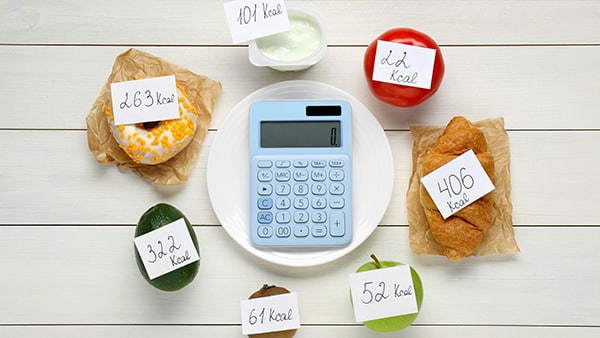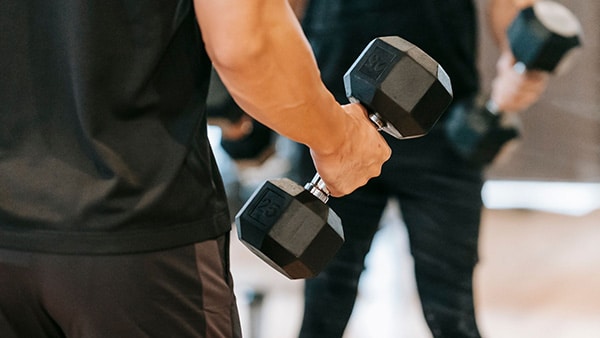Pourquoi je ne maigris pas ? Voilà une question que j’entends souvent. Et si, vous aussi, vous faites attention à ce que vous mangez, vous pratiquez une activité physique régulière… Mais vous avez des difficultés à perdre du poids ?
Alors, il y a très certainement une explication à cela. Voici les 7 raisons les plus courantes qui nuisent à votre objectif.
Pourquoi je ne maigris pas, en bref :
- Vous mangez plus de calories que vous ne le pensez, empêchant le déficit calorique.
- Votre répartition en macronutriments est déséquilibrée, favorisant la prise de poids.
- Vous ne faites pas assez d’activité physique pour brûler suffisamment de calories.
- Vous gagnez du muscle en perdant de la graisse, ce qui peut masquer la perte de poids sur la balance.
- Votre métabolisme est ralenti après une diète trop restrictive ou prolongée.
- Le stress augmente la production de cortisol, favorisant le stockage des graisses.
- Un manque de sommeil perturbe les hormones de la faim et ralentit la perte de poids.
Sommaire
1. Vous mangez trop de calories
« Pourquoi je ne maigris pas alors que je fais attention ? », « Je mange peu et je ne maigris pas »… Je suis certain que vous vous êtes déjà posé ces questions, ou que vous les avez déjà entendues dans votre entourage plus ou moins proche. En tant que coach sportif, elles font partie de mon quotidien.
Pourtant, ces personnes ont tendance à faire du sport, que ce soit de la musculation en salle de fitness ou du cardio en extérieur. Pour la plupart, elles font même l’effort d’adopter une alimentation saine. Mais alors, pourquoi n’arrivent-elles pas à mincir ?
Dans la plupart des cas, la raison est toute simple : leur apport calorique quotidien est supérieur à leur besoin. Car oui, pour maigrir durablement, vous devez créer une situation de déficit calorique. Autrement dit, consommer moins de calories par jour que ce que votre corps n’en dépense.
Vous pouvez utiliser mon calculateur de calories gratuit pour connaître votre besoin journalier en quelques secondes.

Et même si vous avez l’impression de faire attention et d’avoir de bonnes habitudes alimentaires, cela est trop souvent insuffisant.
En effet, il est très difficile d’estimer le nombre de calories d’un aliment ou d’une portion. Nous avons d’ailleurs tous tendance à les sous-estimer.
Pour éviter cela, je vous recommande de peser vos aliments et de noter vos repas dans mon application MetamorphX.
Et si vous avez du mal à contrôler votre appétit, essayez de manger moins vite. Dans le Journal of the Academy of Nutrition and Dietetics, une équipe de chercheurs a observé que la vitesse à laquelle vous consommez vos aliments a une incidence sur l’apport énergétique.
Cela est notamment dû à la leptine, une hormone à l’origine de la sensation de satiété, dont les premiers effets se font sentir environ 20 minutes après le début du repas.
2. Votre ratio de macronutriments est déséquilibré
Il se peut également que votre diète soit déséquilibrée.
Outre l’importance de l’apport calorique, il est tout aussi essentiel de veiller à la bonne répartition de vos macronutriments. Au nombre de 3, ces derniers ont pour mission de fournir de l’énergie à votre corps. Vous les connaissez sous les noms de glucides, protéines et lipides.
Généralement, le régime alimentaire d’une personne lambda est trop riche en glucides et en lipides, et pauvre en protéines, ce qui favorise incontestablement la prise de poids.
Si vous êtes en surpoids et que vous souhaitez perdre quelques kilos, votre rééquilibrage alimentaire devra tenir compte de ces éléments. Misez sur la répartition suivante :
- 35 % de glucides
- 35 % de protéines
- 30 % de lipides
Sachez qu’un apport suffisant en protéines vous permettra de diminuer la sensation de faim entre les repas (et donc le fait de grignoter !), tout en limitant la fonte musculaire.

DÉCOUVREZ MON PLAN DIÈTE PERSONNALISÉ
Vous pensez que perdre du poids et du gras doit être synonyme de frustration alimentaire, de régime draconien et passer des heures sur un tapis de course à faire du cardio à outrance ?
GROSSE ERREUR !
Par ailleurs, limitez au maximum les produits transformés (plats cuisinés, fast foods, jus de fruits industriels, sodas, etc.) et privilégiez des aliments sains à chaque repas (fruits et légumes, oeuf, viande blanche, poisson, riz basmati, légumineuses, etc.).
3. Vous ne faites pas suffisamment d’activité physique
Oui, vous pouvez tout à fait maigrir sans sport.
Toutefois, en plus d’être bon pour votre santé sur le long terme, faire de l’activité sportive régulière vous aidera à brûler des calories. Il sera ainsi plus facile d’être en déficit calorique pour maigrir.
En ce qui concerne les sports à privilégier, ne vous contentez pas de faire de la course à pied. En effet, votre corps va rapidement s’habituer à ce type d’effort, et votre poids risque de stagner.
A contrario, optez pour une combinaison entre des entraînements de musculation et des sessions de cardio d’intensité moyenne. La jonction des deux est un excellent moyen d’augmenter la masse maigre, ce qui permet d’accroître le métabolisme.

4. Vous avez perdu de la graisse, mais gagné du muscle
« Je fais du sport, mais je ne maigris pas » : il s’agit effectivement d’une problématique pour le moins courante.
Regarder vos kilos sur la balance n’est pas le seul moyen de mesurer l’atteinte de votre objectif.
Il est tout à fait possible que vous ayez éliminé du gras, sans pour autant perdre du poids, car vous avez gagné du muscle en parallèle. C’est ce que l’on appelle une recomposition corporelle.
En ce sens, pensez aussi à vous observer dans le miroir pour voir si votre silhouette s’affine au fil des semaines. Le muscle étant moins volumineux que le gras, les résultats sont généralement visibles à l’œil.
Les abdos sont d’ailleurs un excellent indicateur de réussite. Si votre sangle abdominale commence à se dessiner, c’est que votre taux de masse grasse diminue. Vous êtes donc sur la bonne voie !
5. Vous avez le métabolisme bloqué
Un métabolisme bloqué peut avoir pour effet d’endiguer une perte de poids.
Cela se produit à la suite d’une diète trop longue ou trop restrictive. Pour se préserver, l’organisme économise son énergie et ne brûle plus suffisamment de calories. Cela se traduit par un poids qui stagne, alors même que la personne continue à diminuer son apport calorique.
Heureusement, il est possible de relancer le métabolisme en augmentant l’apport. Autrement dit, vous devez manger plus… Pour maigrir ! Je vous explique tout cela en détail dans cet e-book sur la reverse diet.

REVERSE DIET LE GUIDE ULTIME
Boostez votre métabolisme et mangez jusqu’à 1000 calories supplémentaires par jour (SANS prendre de gras)
Pour éviter de le bloquer, veillez simplement à baisser vos calories de manière progressive.
6. Vous êtes stressé
Même si vous avez une alimentation équilibrée et que vous soignez chaque repas, le stress peut réduire vos efforts à néant.
C’est le constat de cette étude menée par des chercheurs de l’Université de l’Arkansas, suggérant qu’une meilleure gestion du stress favorisait le contrôle du poids.

Le responsable de ce phénomène est bien connu. Il s’agit du cortisol, aussi connu sous le nom d’hormone du stress. Un excès de cortisol est responsable d’un stockage des graisses et entraîne des envies de manger des aliments gras.
Faire du sport, du yoga ou de la méditation, apprendre à respirer ou se balader dans la nature sont autant de moyens de se détendre.
7. Vous ne dormez pas assez
Saviez-vous que la qualité de votre sommeil était un facteur important pour perdre du poids ?
Pour perdre de la graisse et s’affiner, il est important d’adopter un rythme de sommeil régulier. Plus largement, c’est un véritable pilier de votre santé et de votre bien-être.
Bien dormir participe à la régulation de la sécrétion de ghréline. Produite en trop grande quantité, cette dernière nous donne une irrésistible envie de manger.
Le sommeil a aussi des effets sur la leptine, dont nous avons déjà parlé précédemment.
Globalement, essayez d’avoir des cycles de sommeil réguliers. Si vous avez des difficultés à vous endormir, de nombreuses techniques existent : limiter le temps d’écran, baisser la température de la pièce, faire des exercices de respiration ou encore éviter le café en fin de journée.

Conclusion
Vous l’avez compris, il est inutile de faire des régimes draconiens, intenables sur le long terme, surtout si vous souhaitez éviter l’effet yoyo. Vous parviendrez à maigrir en surveillant votre apport calorique et en mangeant sainement, sans se priver pour autant.
Pour aller plus loin, si vous cherchez comment débloquer la perte de poids, découvrez cet article qui vous détaille les 7 étapes d’une bonne sèche.
FAQ
Même si vous mangez sainement, vous consommez peut-être plus de calories que vous ne brûlez. Pour perdre du poids, un déficit calorique est nécessaire.
Si vous faites du sport mais ne perdez pas de poids, c’est souvent parce que votre alimentation n’est pas adaptée. Il est aussi possible que vous gagniez du muscle en perdant du gras.
Utilisez un calculateur de calories et pesez vos aliments. Beaucoup sous-estiment leurs apports et dépassent leur besoin énergétique sans s’en rendre compte.
Oui, le stress augmente le cortisol, une hormone qui favorise le stockage des graisses et les envies d’aliments riches en sucre et en gras.
Un régime trop long ou trop restrictif ralentit votre métabolisme. Pour le relancer, il faut augmenter progressivement les calories et éviter les restrictions extrêmes.
Oui, un mauvais sommeil perturbe les hormones de la faim et favorise le stockage des graisses. Dormez suffisamment pour optimiser votre perte de poids.
Oui, mais l’activité physique aide à brûler plus de calories et à préserver la masse musculaire. Une bonne alimentation reste le facteur clé.






